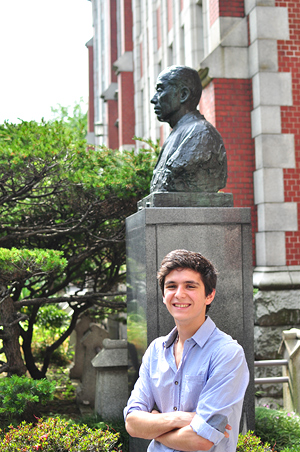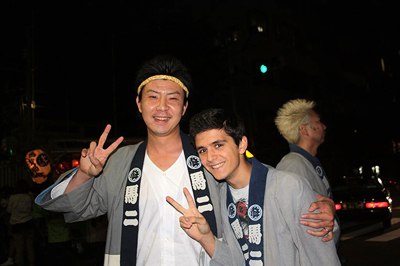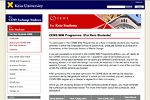Header start
Header start
- Home
- Student Life
- Student Voices
Antonio Correia Neves (Portugual)
Antonio Correia Neves (Portugual)
Content start
"Learning how to adapt to life in a vast, rapidly changing city"

Antonio Correia Neves
Home country: Portugal
Exchange Student, CEMS Masters in International Management
Home CEMS Member School: Nova School of Business & Economics, Portugal
Donning a happi and carrying a Japanese shrine down the streets of old Asakusa, Antonio Correia Neves is making the most of the cultural differences from his native Portugal. Antonio lives near Keio's Hiyoshi campus, nestled between the vibrant cities of Tokyo and Yokohama, and has acclimated to Japan—from hot springs to finding the best ramen in town. He fills his weekends with events throughout the area saying, "I like spending as much time as possible with the local people." His flexible outlook is apparent in his studies, which entail the CEMS business project developing business strategies for one of Keio's global partners. When asked about his choice of Japan, he smiles saying, "It's the best choice I could have made."
What have you particularly enjoyed about your course?
The business project, hosted by one of the CEMS corporate partners; it is really interesting to be able to analyze a working business model and what would and wouldn't work outside of Japan. Another very positive aspect of the project is the fact that the CEMS group is a mixture of students of different nationalities and backgrounds, because this naturally generates a variety of ideas and also gives you the chance to educate yourself on how to communicate with all kinds of people.
What are the benefits of studying in Tokyo or Japan?
Learning how to adapt to life in a vast, rapidly changing city like Tokyo is a good skill for my future career. No doubt there will be many cases in which I will have to respond to new situations and challenges and I am sure this experience will be really helpful.
I have also found that my experiences in Japan have taught me to look at things through other peoples' eyes. There are things about Japanese culture that I like and there are some that I just don't agree with. My experiences here have taught me that sometimes I have to look at things from a different point of view.
What challenges have you faced and how have you coped with them?
Learning Japanese, especially formal Japanese, can be difficult and so communication can sometimes be a problem, but most Japanese people are so helpful and put so much effort into understanding you that the language barrier disappears. On my very first day in Japan, I left my bag on the train by mistake and had to ask the station staff to help me get it back. Even though I could only speak a little Japanese and the station staff could only speak a little English, they did their very best to help me, and I had my bag back in an hour!

It has also been very helpful being able to share stories with the other CEMS students, and I have had great support from a Japanese friend.
What was one of your favorite memories of Japan?
One of my favorite memories is taking part in the Sanja Matsuri (annual festival in May) in Asakusa. During the festival, the people from the local neighborhoods take turns carrying their portable shrine in a procession. In order to be allowed to carry it you need a happi, a special coat marked with the symbol of the neighborhood, and I was lucky to have a Japanese friend who knew someone in the neighborhood who got me a happi and helped me get involved. At first I was worried that the local people would not want a foreigner carrying their shrine, but I was made to feel welcome and it was a great opportunity to meet local people. The atmosphere is really lively and fun, with everyone jumping and singing, so it was also very different to the festivals that I am used to back at home in Portugal, which are very solemn.
What would be your advice for future international students?
My advice would be to come a few weeks before your classes start, so that you can get accustomed to life in Japan and make the most of the opportunity to do some travelling. You will realize that there are so many different sides to Japan.
Read blogs and sign up for newsletters to find out things to do in Tokyo. There is so much to do, so much to experience, so try to do as much as you can!
What would you recommend international students to do at Keio?
Try to get to know the local students; they are the ones that know the cool stuff that doesn't go in the guides, and they are probably interested in you, too!
Don't be shy! Go to every event and welcome party possible.
(This interview is from June 2012.)



